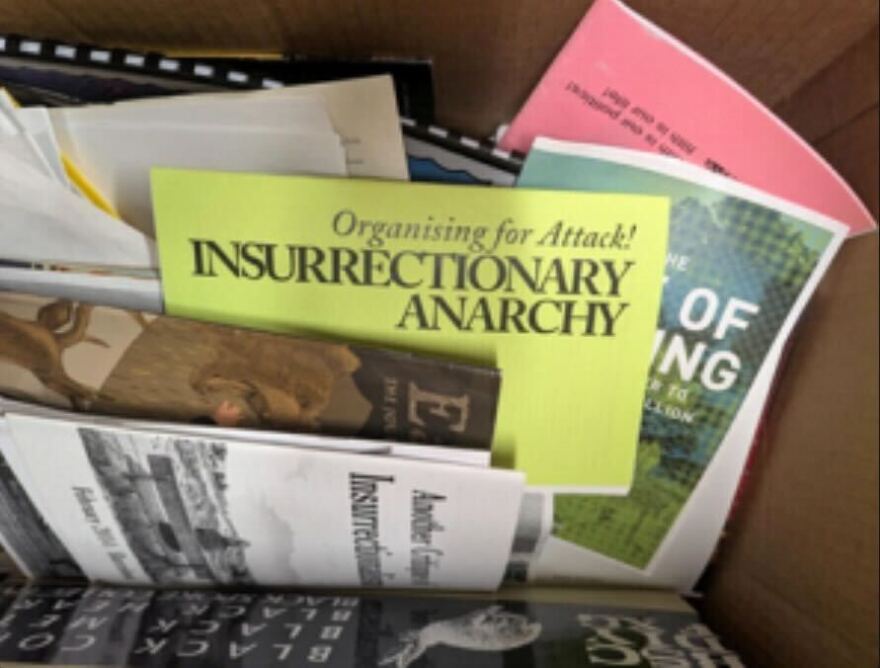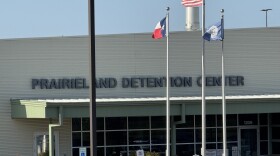In the span of six months, 18 people ages 20 to 57 from across North Texas and College Station have been arrested and charged with varying degrees of severity for a July 4 shooting at the U.S. Immigration and Customs Enforcement detention center in Alvarado.
Two were recently indicted for what federal authorities have called a “coordinated attack” motivated by one movement: “antifa,” a nebulous ideology President Donald Trump deemed a domestic terrorist organization last month.
The designation is the first of its kind in history, not used even for notorious, longstanding groups like the Ku Klux Klan. The initial Prairieland indictments are also the first-ever federal terrorism charges associated with antifa, according to FBI Director Kash Patel.
All this comes after a year marked by high-profile incidents of political violence that some politicians have deemed the work of violent leftists. Left-wing violence outpaced right-wing violence this year for the first time in three decades, according to a report by the Center for Strategic and International Studies, though the numbers were relatively small: CSIS reported five left-wing attacks compared to one right-wing attack during the first half of 2025.
Now, the case being built against the Prairieland suspects could serve as a playbook for how purported left-wing violence is prosecuted throughout the Trump administration.
Key players
Zach Evetts, 36, and Autumn Hill, 30, are accused of providing material support and resources to terrorism for being part of a "North Texas Antifa cell" that carried out the shooting, according to their indictment. Authorities say they and 16 other defendants contributed to the “ambush” and “coordinated attack” on the Prairieland ICE Detention Center.
About 10 minutes after an initial group in all-black started shooting fireworks toward the building the night of July 4, court records allege Evetts and Nathan Baumann broke off from the main group and started spray painting and damaging vehicles and a guard structure in the parking lot. A car registered to Evetts was also parked at Prairieland, according to court records.
Correctional officers called 911, and Alvarado Police Lt. Thomas Gross arrived at the scene minutes later. Several people began to flee on foot and ignore verbal commands, court records allege.
Then someone in a green mask shot Gross, who fell when the bullet struck him in what court records alternately say was the back or the neck, and he fired three rounds in response. Gross is now back on duty, according to an FBI investigator’s court testimony last month.
The Venus Police Department arrested Evetts around 2 a.m. as he walked along Highway 67 about three miles away. During a search, officers say they found a black balaclava mask, a pair of tactical style gloves, and a pair of safety goggles. Evetts reportedly said he didn’t know where he was coming from — or something to that effect — when questioned by police.
Hill was arrested at the home in Dallas she shared with Meagan Morris the day after the shooting. A codefendant confirmed Hill was at Prairieland, but it’s unclear the exact role she’s accused of playing the night of the shooting.
Several defendants, along with prosecutors, have accused 32-year-old former Marine Corps reservist and codefendant Benjamin Song of bearing sole responsibility for firing at law enforcement that night. Some defendants and their attorneys deny an intent to do anything but make noise and protest in support of immigrants detained at Prairieland.
But proving a desire for an intended outcome isn’t what the law requires — meaning anyone involved, no matter how small their role, could be charged, said Errin Martin, a former assistant U.S. attorney in the Northern and Eastern Districts of Texas.
“It could have been a firearm, it could have been transportation,” Martin said. “Whatever the support was for terrorism, they didn't have to know how it would end or intend that that's the way it would end to be guilty of that crime as alleged.”

What is antifa?
"Antifa" is short for anti-fascism. Opposing fascism — an oppressive, authoritarian philosophy — should be seen as a good thing, said Jason Blazakis, a professor at the Middlebury Institute of International Studies and executive director of the Center on Terrorism, Extremism and Counterterrorism.
“Fascism is a scourge,” Blazakis said. “It's a threat to U.S. life and wellbeing and a threat to the constitutional protections Americans have.”
In practice, antifa has become an umbrella term for left-wing beliefs like socialism, communism, anarchy and general opposition to right-wing politics. It’s also been deemed the source of instances of violence during protests like those in 2020 following the murder of George Floyd, when Trump first expressed a desire to designate antifa as a terrorist organization.
The government in this case describes antifa as a network of groups that believe in anarchist or Marxist ideology and oppose the U.S. government, especially under Trump's immigration policies. But it's not a centralized, formal organization of which someone can be a member, and there are no identifiable leaders.
While the Secretary of State designates foreign terrorist organizations, there's no formal process for designating domestic terrorism organizations. There's also no federal criminal statute to charge people for domestic terrorism like there is for foreign terrorism.
Hill and Evetts’ charges amount to helping an act of terrorism, not supporting a specific terrorist organization, Blazakis said. But considering Trump’s designation came two months after the Prairieland shooting, Blazakis said it feels like the government is painting a picture in hindsight.
“I think there's no question that something happened very bad on the Fourth of July, a violent act that I think could be seen as terrorism,” he said. “But it's very hard for me to link that act today to some kind of antifa structure, as the government has tried to do.”

‘What did they know and when did they know it?’
The government doesn’t have to prove antifa is an established terrorist organization to bring the charges against Hill and Evetts — but it will certainly help in court, legal experts say.
Prosecutors allege the defendants' group chat messages and literature they shared are evidence of anti-law enforcement beliefs and an intent for violence the night of July 4. Those arrested will also have to answer for guns and body armor found at the scene.
Portraying the defendants as a group united by antifa and a collective terroristic intent bolsters the government’s case, said Leigha Simonton, former U.S. attorney for the Northern District of Texas. It could also make it easier to admit antifa-related evidence in court for the jury.
“There are people who've heard of antifa. A lot of people don't really know what it is. A lot of people understand that it somehow dovetails with some anti-government sentiment,” Simonton said. “I think anytime you can label a movement, even a local organization or cell like this — a group of people, an affiliation — with a group that people have heard about, it would benefit the government.”
In a pretrial motion filed Monday, Evetts’ attorneys said there was no evidence tying his client to antifa and asked the court not to allow the government to mention antifa given the current political climate.
“Against this backdrop we must select a jury and strive to select an unbiased one,” the court filing states. “Injecting politically charged terms … can serve no purpose but to inflame the passions of any potential juror who holds a pro-Administration (and thus, pro-Government) view on current political events.”
That motion was soon denied.
If the arrestees were ever united, there’s evidence that they’re now splintering. Cooperating defendants have already given the government information necessary to pursue further arrests, and prosecutors have said in court records that they expect some plea deals between now and December. Song, the alleged shooter, notably hasn’t been indicted yet.
Evetts and Hill being the first two indicted could mean the government had the strongest evidence against them, Simonton said — and perhaps they didn’t want to cooperate with prosecutors.
“It all comes down to, ‘what did they know and when did they know it?’” Simonton said. “Did they all understand when they went to the facility that the object of their plan was to shoot at federal or state law enforcement officers? Or did they think it was something less in terms of just aggravating them, shooting the fireworks, et cetera?”
The future, and First Amendment implications
Antifa’s broad definition as a left-wing group by the White House and the administration’s demonstrated focus on prosecuting those beliefs as terrorism worry Tom Brzozowski, former counsel for domestic terrorism at the Department of Justice.
“That's incredibly dangerous,” Brzozowski said. “It introduces a degree of ambiguity that is going to result in Americans choosing to not exercise their constitutional rights for fear of being swept up in some kind of dragnet.”
Texas Attorney General Ken Paxton recently announced his own plans for undercover investigations specifically of “leftist terror cells,” with the Prairieland shooting and Charlie Kirk’s killing prompting the move.
Others, like former Texas assistant U.S. attorney Martin, say it’s not infringing on constitutional rights to investigate whether people’s speech is evidence of terroristic intent. Notably, the First Amendment doesn’t protect speech meant to incite illegal behavior or true threats of violence.
“Protected speech is the speech, but the speech could also be evidence of a crime,” Martin said.
Whether the Prairieland defendants were simply exercising their constitutional rights or intended something more violent will ultimately be up to the Fort Worth federal jury that hears Evetts and Hill’s case starting Nov. 24. And it’s one to watch carefully, Brzozowski said.
“I do think this is vitally important for the administration,” he said. “They are desperate to be able to point to something that's written in black and white in a court document that says ‘antifa.’”
Toluwani Osibamowo is KERA’s law and justice reporter. Got a tip? Email Toluwani at tosibamowo@kera.org.
KERA News is made possible through the generosity of our members. If you find this reporting valuable, consider making a tax-deductible gift today. Thank you.





